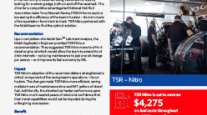Diesel Prices Increase Again as Exports Reach New Record
This story appears in the July 23 print edition of Transport Topics.
The average retail price of diesel fuel increased for a second week, rising 1.2 cents a gallon, which oil analysts attributed to higher crude oil prices and record-breaking distillate exports from the United States.
Diesel cost an average of $3.695 a gallon last week compared with $3.683 the previous week, the Department of Energy reported July 16.
Retail gasoline prices also rose for the second week, reaching $3.427 a gallon, up 1.6 cents over the previous week’s $3.411, the DOE said.
Diesel’s two-week bump is the result of both national and global dynamics, analysts said. In the United States, the record exports are shrinking domestic supplies of distillate, from which diesel is refined. Globally, Middle East tensions roiled crude oil markets.
Although crude oil supplies in the United States are high — 377.4 million barrels as of July 18, compared with a range over the past five years of 295.3 million to 353.5 million barrels — exports of refined distillates are growing, making them less available in the U.S. market.
“Refinery production is strong right now, but there’s a lot going on in the export side,” said Timothy Hess, oil analyst at the DOE’s Energy Information Administration.
April exports of distillate products — diesel and heating oil — reached 980,000 barrels a day, the highest since monthly U.S. trade data have been recorded, DOE said July 19.
“It’s really a transportation story,” Hess said, explaining that the exports are largely powering vehicles in Mexico and South America.
A July 6 DOE report said stockpiles of distillate dropped to 120.9 million barrels, and although supplies climbed back to 123.5 million barrels the following week, in the past five years the normal range for distillate supplies at this time of year has been 123.7 million to 166.6 million barrels, the DOE said.
Also, crude prices have risen lately.
“We’ve seen crude prices up over the last couple weeks and that’s filtering its way into the product price increase,” Hess said.
Crude closed at $92.66 a barrel on the New York Mercantile Exchange on July 19, after climbing 10% in seven days and selling for as low as $77.28 on June 28. “Obviously, there seems to be some increase in the risk premium surrounding Iran,” said Phil Flynn, an analyst at Price Futures Group in Chicago.
On July 16 in Israel, U.S. Secretary of State Hillary Clinton reiterated warnings to Iran over its nuclear development. Two days later, a bus carrying Israeli tourists in Bulgaria was bombed. Israel blames Iran.
Flynn said some analysts believe crude oil prices had retreated well below $90 a barrel in the late spring because the markets underestimated the potential effects of the embargo the European Union put on Iranian oil imports; the embargo went into effect July 1.
Whether price changes are due to global or local dynamics, Steelman Transportation Inc. in Springfield, Mo., takes an aggressive approach, said president and primary owner Jim Towery.
“Nobody gets a truck without paying a fuel surcharge,” said Towery. “We survive by stating that if there’s not a decent fuel surcharge, then we can’t work for you.”
Towery said he adjusts the surcharge every Tuesday morning, based on DOE’s weekly report published Monday afternoons.
Steelman is a fleet of about 115 flatbed trucks hauling steel and steel products. The fleet is 100% owner-operated. Steelman collects the surcharge and passes it to drivers who buy fuel on the road with the guidance of daily price reports that Steelman provides to them, Towery said.
“We were squeezed earlier in the spring,” he said. “We’ve enjoyed the glide down, but it’s always in arrears.”
In Great Falls, Mont., Mick Myskewitz, vice president and managing partner of Taylor’s Transportation, an auto hauler with 18 trucks, said he does not use surcharges; he has tried several times to cut fuel costs but has not had much success.
“We’ve tried super-singles on the trucks and trailers; that didn’t help,” Myskewitz said. “They’re supposed to reduce the rolling resistance and increase fuel economy . . . but if you break down between North Platt, Neb., and Omaha, there’s no help for those kinds of tires. You can’t carry a spare.”
Myskewitz said any savings in fuel costs was wiped out by the cost of roadside service calls when a super-single tire had to be replaced.
Auto haulers have much more wind resistance relative to other kinds of fleets, he said. “When we’ve got 10 cars on our trailers, there’s so many little pockets of air . . . we have so much rolling resistance.”
Myskewitz said he tried different engine oils for fuel savings and has governed the truck to 62 mph, something the drivers “hate,” he said.




